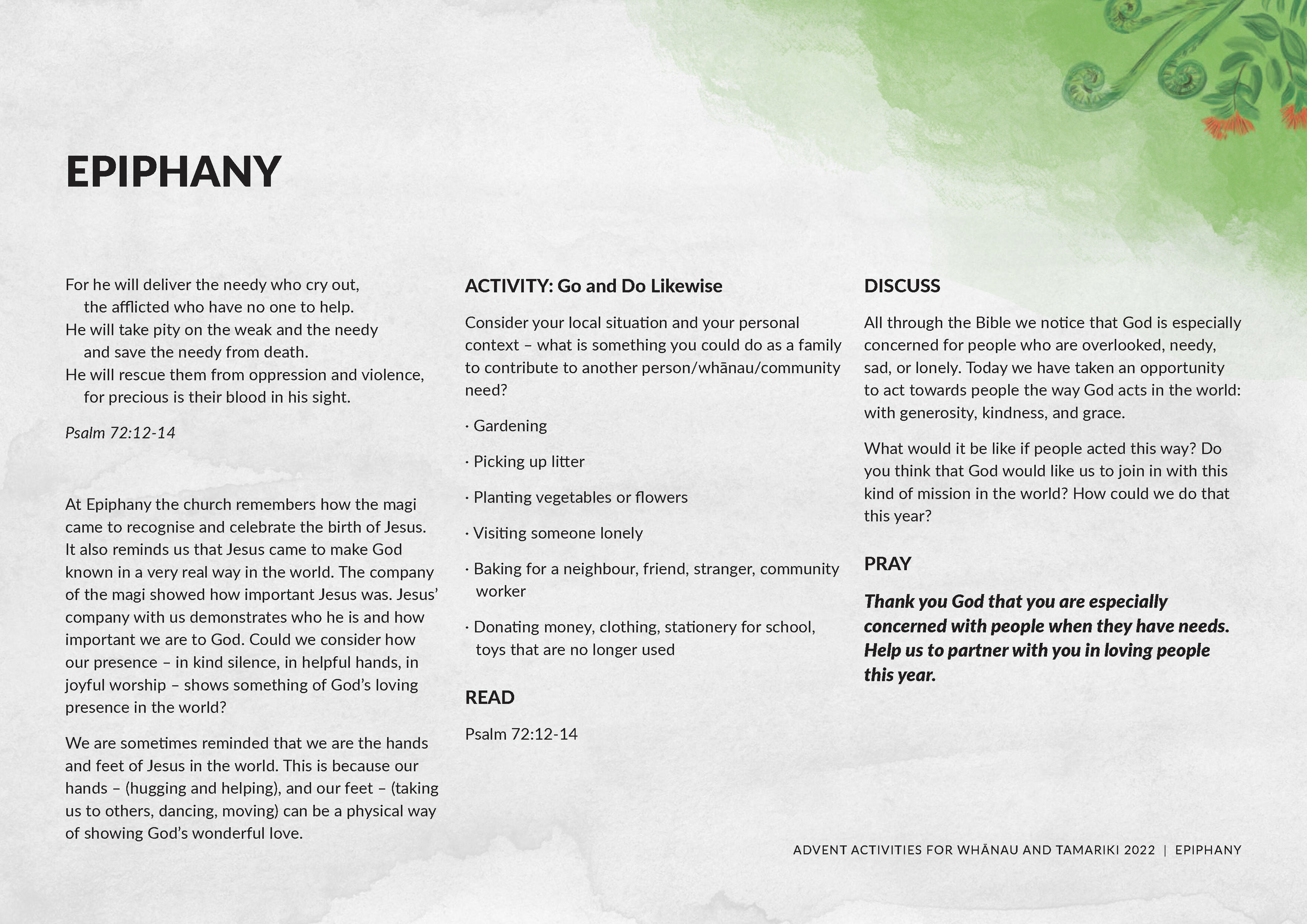Epiphany
(1 - 7 January)
We recommend that you read the Scripture passage and short reflection in our “Advent Readings” on the Sunday of each week – beginning on the first day of Advent: Sunday, 27 November. You can reflect on it all week. Below are some additional resources for consideration, wondering, and worship during this season. Enjoy!

Isaiah 60:1-6 | Ihāia 60:1-6
Psalm 72 | Waiata 72
Ephesians 3:1-12 | Epeha 3:1-12
Matthew 2:1-23 | Matiu 2:1-23
*Note: For those who follow the Lectionary Calendar and Church Year, Advent 2022 marks the beginning of cycle or “Year A”. The weekly Scripture passages in our readings are from each Sunday of Advent – with the exception of Epiphany. If you would like additional Bible readings, you can follow along with the daily recommended readings for this season.
From: Anglican Church in Aotearoa, New Zealand and Polynesia
You can download the 2022 (for Advent and Christmas) and 2023 (up to Epiphany) versions of the lectionary.
Another resource is the Vanderbilt Divinity Library

Click on the title or icon to listen to the playlist.

CHRISTMAS & EPIPHANY: The King has come!
You can find songs about Christ’s joyous arrival in our Christmas & Epiphany playlist, along with songs about the incarnation and what it means that God became human and lived among his people.
The first part of the playlist includes contemporary renditions of Christmas carols and hymns. The second part of the playlist includes sacred and choral music for the Christmas season.


Muriwai, 2022 - Acrylic on canvas
I chose Muriwai as my landscape, relating to Epiphany's awe of God's creation.
I am in awe of
This place you have coloured in
Home away from home
Joshua D. F. Young, Counselling Student

Presents or Presence?
What gift can I bring
to worship The King?
The angels they sing
ancient echoes ring
Keen shepherds draw near
unblemished Lamb, rare
“Hush, This One we fear”
Distant mandate clear?
Magi travel bold
balm Gilead—gold
myrrh, incense unsold
Priceless Love behold
So what will you bring
to worship this KING?
What kind of a thing
makes an offering?
“Have credit
my cash
so I won’t buy trash
Time, talents rehash
my treasures I’ll stash.”
I long for your heart
your inn, there I’ll start
My Glory impart
lavish gifts—My heart!
THIS Gift, no other
unwrap
discover
layers uncover
I AM your Lover
“Great King of Glory
herald Your story
through me
From the ‘Tree’
ring Your victory.”
Want just My presents
or all My Presence?
Conduct My presents
or ample essence?
“It’s You I’ll pursue
nothing else in lieu
Yearn for mankind—to
unwrap all of You.”
I AM always present
© 2021 Barbara J. Harry, BCNZ Alumni

“Epiphany” is from the Greek term epiphaneia “appearance”. Paul uses the term in 2 Timothy 1:10 when he describes how God’s grace has been revealed through the appearance of Jesus on earth. Epiphany commemorates that appearance, and in particular it commemorates the first time Jesus appeared to Gentiles. Jesus’ appearance to the Magi in Matthew 2:1-12 is the first recorded instance of Gentiles encountering Jesus. They recognised Jesus was a king and honoured him with their gifts. What they could not know, what no one yet recognised, was the true significance of Jesus’ appearance, or the fact that it was anticipated as long ago as Genesis.
The Lord makes a number of wonderful promises to the patriarchs in Genesis, but none is more wonderful than his promise that they would be the ancestors of kings, and the means of bringing blessing to all nations (Genesis 12:1-3; 17:3-6; 22:17-18; 28:13-14 cf. 49:10). Remarkably we see these two promises converge in our reading from Psalm 72, a beautiful prayer for Israel’s king. The prayer would have served well at a king’s coronation, presenting as it does the image of the ideal king. And a notable feature of the ideal king is that, “All nations will be blessed through him” (72:17).
We see the beginnings of this blessing in Matthew 2:1-12 when the Gentile Magi encounter the child king, Jesus. And by the end of Matthew’s Gospel Jesus has suffered and died, and he has risen from the dead. His appearing has become so much more than anyone expected and it is now time for God’s blessing to go to all nations. This is why Jesus’ final command to his disciples is to, “Go and make disciples of all nations” (28:19).
No one took Jesus’ command more seriously than Paul, the apostle to the Gentiles (Romans 11:13). In Ephesians 3:1 we find him a prisoner for his calling. Paul is concerned his imprisonment will discourage his readers, and so he spends the next few verses expressing his sense of privilege that God called him to announce the message that Gentiles are equal partners with Israel in receiving all the riches that are to be found in Jesus Christ. Paul is emphatic. The blessing that comes to Gentiles is in every sense equal to the blessing God bestows on his people Israel. Gentiles and Israel are “members together of one body and sharers together in the promise of Christ Jesus” (3:6).
Epiphany is an opportunity to reflect on the love and faithfulness of our God. He has kept promises to bless us that he made millennia ago. And who could have imagined the riches contained in those blessings; riches that have come to us with the appearing of his Son and our Saviour.
This grace was given us in Christ Jesus before the beginning of time, but it has now been revealed through the appearing of our Saviour, Christ Jesus, who has destroyed death and has brought life and immortality to light through the gospel (2 Timothy 1:10).
Dr Richard Neville, Theology Lecturer

Miriam Fisher (Location Lead & Lecturer - Education, Ōtautahi/Christchurch), has prepared an activity based on the theme of each week of Advent. You can download this week's right here.

These may need amending to suit the age and stage of those in your whānau but we hope they will offer you an opportunity to engage in this season simply and meaningfully with your tamariki. You might come up with new variations!
